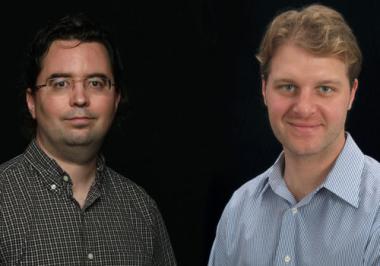University of Massachusetts-Amherst graduate and music fanatic Kembrew McLeod has long been fascinated by the intersection of art and commerce. Now an associate professor of media studies at the University of Iowa—after earning his Ph.D in communication from UMass—he has published two books on the topic: Owning Culture: Authorship, Ownership and Intellectual Property Law (Lang, 2001) and Freedom of Expression?: Overzealous Copyright Bozos and Other Enemies of Creativity (Doubleday, 2005), which received the Oboler book award from the American Library Association.
McLeod also released a documentary in 2000 called Money For Nothing: Behind the Business of Pop Music, which went on to receive the Rosa Luxemburg Award for Social Consciousness.
His latest film, Copyright Criminals, an Exploration of the Creative and Legal Ramifications of Music Sampling in Hip-Hop, focuses on artistic expression, hip-hop's history of reusing sounds, the uneasy relationship between sampling and copyright law, and how the explosion of technology and home production has further muddied the waters for musicians, producers and artists across the spectrum.
The documentary, made alongside director, editor and cinematographer Benjamin Franzen, features on-screen interviews with the likes of Public Enemy's Chuck D., George Clinton, De La Soul, DJ Spooky, and "the world's most sampled drummer," Clyde Stubblefield, who provided many of James Brown's legendary backbeats.
Northampton's Media Education Foundation (MEF) hosts a free screening of the film Nov. 14, in advance of its national premiere on the PBS documentary series Independent Lens. McLeod took time out recently to answer a few questions about his latest work.
Valley Advocate: Tell me a little about the impending MEF screening and your ties to the Valley.
Kembrew McLeod: Sut Jhally, MEF's Executive Director, was my dissertation advisor, and when I finished my dissertation earlier than planned, he tapped me to produce a video on the music industry, which eventually became Money For Nothing: Behind the Business of Pop Music, co-produced by Jeremy Smith and Thom Monahan. Last year, MEF released an educational documentary companion to my book Freedom of Expression?: Resistance and Repression in the Age of Intellectual Property—both the book and the DVD share the same title. I spent five years in the Happy Valley, and then headed off to Iowa City, where I have taught at the University of Iowa for the past 10 years.
When, how and why did this most recent project come about?
I first got interested in the subject in the early 1990s, when a lot of my favorite sample-based artists—De La Soul, Public Enemy, and Negativland—started getting sued. Since then, I went on to write a couple books about the subject of copyright and culture, and I've also made a couple educational documentaries with the Media Education Foundation. Jeremy Smith co-produced both of my earlier documentaries.
What were the attitudes of some of the highly sampled musicians, like Clyde and George?
Mostly, Clyde just cares about getting credit for his work, and circulating his name out there in the world. For him, money isn't the important thing, though of course I'm sure he wouldn't mind being paid. Both George Clinton and Clyde Stubblefield have no problem with sampling at all.
What were the viewpoints of a majority of the samplers and producers who borrow liberally?
The viewpoints of the artists who sample vary, so there's no single monolithic position that sample-based artists have. But to generalize, most feel that you should pay and/or give credit for significant uses of musical quotations—like taking a hook of another song—but a lot believe that there ought to be some uses that shouldn't require permission or payment, such as very short, fragmentary quotations.
I hear a great many people, mostly young folks, say that music should be free. It's all they've ever known, "free" digital files of music. Has music—and, more recently, video—become devalued with the advent of new technologies, particularly the Internet and mass file sharing?
I don't know if technology has devalued music, but it certainly has changed the way people consume music. When the phonograph came along over a hundred years ago, this technology certainly made sheet music publishers lose revenue. In the 1930s, the rise of radio and the Great Depression conspired to make the recording industry collapse, and so on. New technologies will always be disruptive, which doesn't mean that musicians shouldn't be paid. It just means that we need to find ways to adapt to the changes in the ways music is produced and consumed.
Do you feel that, in the end, you got an answer to the core question of "owning a sound?"
There's no way to get to any substantive answers in an hour-long documentary, or even, really, a 300-page book. The point of the documentary is to start a conversation.
Copyright Criminals screens Saturday, Nov. 14 at 7:30 p.m. at the Media Education Foundation, 60 Masonic St., Northampton. The event is free and open to the public.



